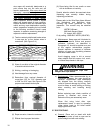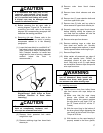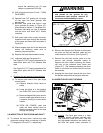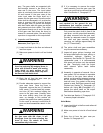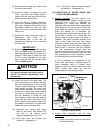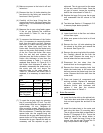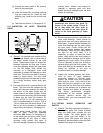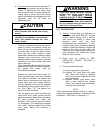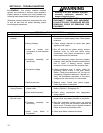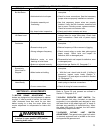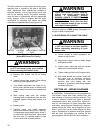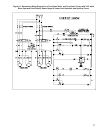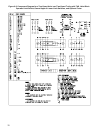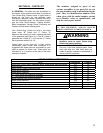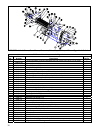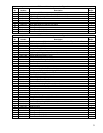
24
SECTION VI – TROUBLE SHOOTING
6-1. GENERAL. This section contains possible
causes and solutions to common hoist problems.
Please attempt to remedy your hoist problems by
following these steps before contacting the factory.
Whenever servicing electrical components be sure
to shut off and lock out power following proper
lockout/tagout procedures.
WARNING
Working in or near exposed energized
electrical equipment presents the
danger of electric shock.
TO AVOID INJURY:
DISCONNECT POWER AND IMPLEMENT
LOCKOUT/TAGOUT PROCEDURE BEFORE
REMOVING COVER OR SERVICING THIS
EQUIPMENT.
SECTION VI – TROUBLE SHOOTING
TROUBLE PROBABLE CAUSE REMEDY
6-1 Hoist Will Not
Operate.
a. No power to hoist.
b. Wrong Voltage.
c. Loose or broken wire
connections in hoist electrical
system.
d. Contactor assembly not
functioning.
e. No control voltage.
f. Motor burned out.
a. Check switches, circuit breakers or fuses and
connections in power supply lines. Check power
collectors.
b. Check voltage required on motor data plate
against power supply.
c. Shut off and lock out power supply; remove
electrical cover on hoist and check wiring
connections. Also check connections in push
button station and limit switches.
d. See that necessary jumper wires are properly
installed. Verify that the contactor armatures are
free to move. If binding occurs, replace
contactor. Check for burned out contactor coils.
e. Check transformer fuse. If blown, check for
grounding and/or shorts in the push button
station. Check the transformer coil for signs of
overheating. Replace transformer if burned out.
Verify the transformer secondary is the same
voltage as the coils to which it is connected.
f. Replace motor. Check input power supply.
Check hoist motor connections.
6-2 Hook Moves in
Wrong Direction.
a. Reverse phasing on three-
phase hoists.
b. Hoist wired incorrectly.
a. Interchange any two power supply line leads.
Refer to Section II, Paragraph 4.b.
b. Check wiring connections with appropriate
wiring diagram.
6-3 Hook Will Raise
But Not Lower.
a. Lower electrical circuit open.
b. Contactor assembly not
functioning
c. Down, push button is
inoperative.
a. Check for loose connections. See that necessary
jumper wires are properly installed on contactor.
b. See that necessary jumper wires are properly
installed. Verify that the contactor armatures are
free to move. If binding occurs, replace contactor.
Check for burned out contactor coils.
c. Check push button contacts and wires.



